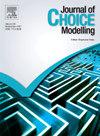Exploring the choice landscape: Anchoring and framing effects on search behavior in complex choices
IF 2.4
3区 经济学
Q1 ECONOMICS
引用次数: 0
Abstract
Complex choices entail consideration of multiple variables characterized by non-linear interactions. Prior research into such choices neglects two categories of major choice determinants: heuristics and biases. Our research integrates such behavioral determinants of decision making into the study of complex choices. We approach this challenge using a new experimental paradigm in which participants tune on-screen dials representing choice variables. Through their tuning efforts, participants can discover information about the choice space. Specifically, this paradigm allows us to document how anchoring and framing effects impact complex choice processes. We find that loss framing incites participants to expend more effort exploring choice variables before selecting an option. An aspirational anchor, on the other hand, correlates with decreased search effort. Additionally, when participants did not have an aspirational anchor, the data suggest they anchor on prior experience.
探索选择景观:复杂选择中搜索行为的锚定和框架效应
复杂的选择需要考虑以非线性相互作用为特征的多个变量。先前对这类选择的研究忽略了两类主要的选择决定因素:启发式和偏见。我们的研究将这些决策的行为决定因素整合到复杂选择的研究中。我们使用一种新的实验范式来应对这一挑战,在这种范式中,参与者调整代表选择变量的屏幕刻度盘。通过调优工作,参与者可以发现有关选择空间的信息。具体来说,这个范例允许我们记录锚定和框架效应如何影响复杂的选择过程。我们发现损失框架激励参与者在选择一个选项之前花费更多的精力来探索选择变量。另一方面,一个有抱负的锚与减少搜索努力相关。此外,当参与者没有理想锚时,数据表明他们会根据先前的经验进行锚定。
本文章由计算机程序翻译,如有差异,请以英文原文为准。
求助全文
约1分钟内获得全文
求助全文

 求助内容:
求助内容: 应助结果提醒方式:
应助结果提醒方式:


